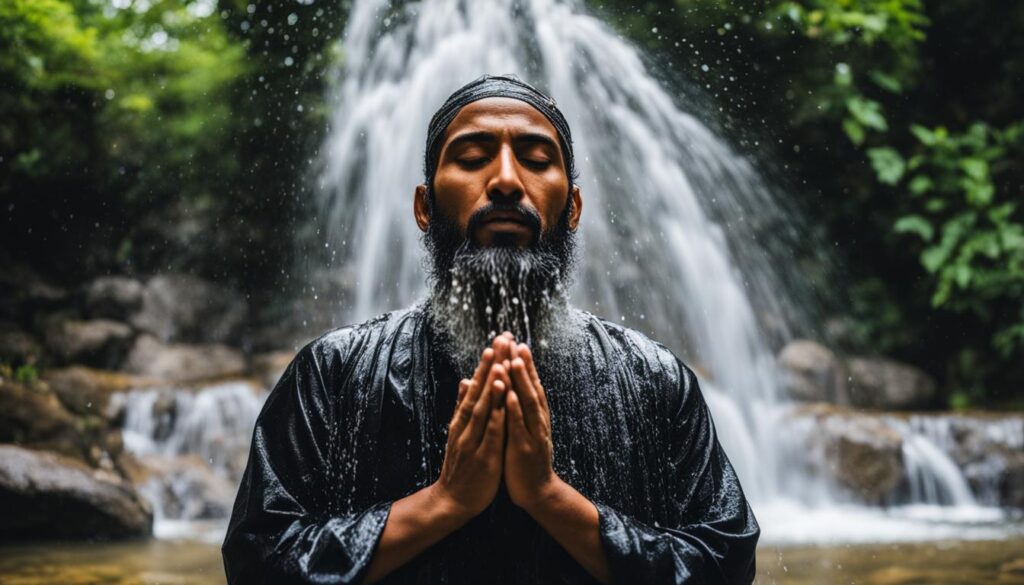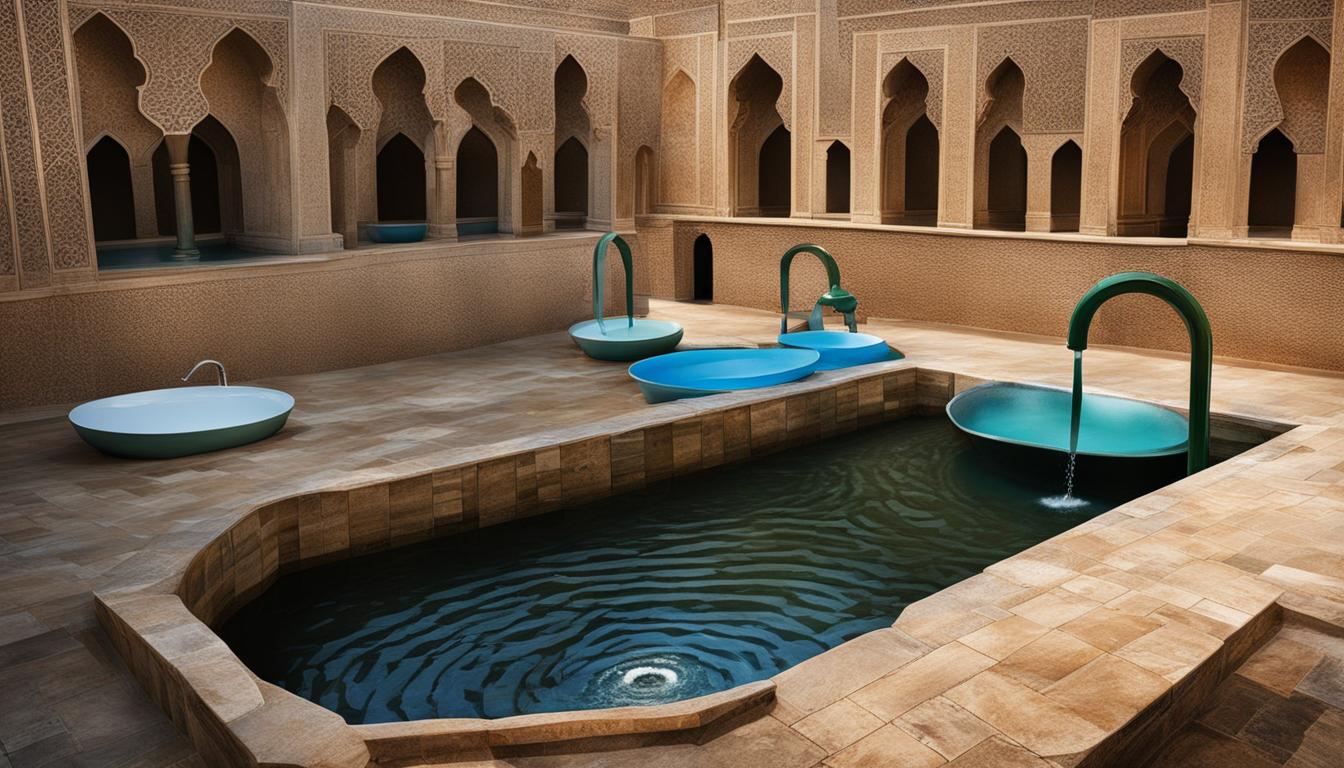Ablutions are ceremonial washings performed in many societies and religions, including Islam. In Islam, there are two main types of ablution: wudu and ghusl. These ablutions are performed for different purposes and have specific guidelines and rituals associated with them.
Key Takeaways:
- Islam has two main types of ablution: wudu and ghusl.
- Wudu is performed before prayer and involves washing specific parts of the body.
- Ghusl is a more comprehensive form of ablution and is performed in specific situations, such as after sexual intercourse or menstruation.
- Ablution is considered essential in Islam for purifying oneself before engaging in worship and communication with Allah.
- Similar ablution practices can be found in other religions and cultures, highlighting their universal importance.
Understanding Wudu: The Ritual Ablution in Islam
Wudu, also known as ablution, is an essential practice in the Islamic tradition. It is performed by Muslims before engaging in prayer as a way to purify oneself before communicating with Allah. Wudu involves the ritual cleansing of specific parts of the body, including the hands, face, arms, and feet. This act of purification is not only physical but also serves as a symbolic gesture representing spiritual cleanliness.
The significance of wudu in Islam cannot be overstated. It is believed that through this ritual ablution, a person’s sins are washed away, and they are spiritually prepared to stand before Allah in prayer. The act of performing wudu also helps to focus the mind, set aside worldly concerns, and enter a state of purity and concentration. It is a way to detach from mundane activities and connect with the divine.
It is important to note that wudu is distinct from ghusl, which is another type of ablution. While wudu is performed before prayer, ghusl is a more extensive form of ablution that is required in certain situations, such as after sexual intercourse or menstruation. Ghusl involves a complete bath, whereas wudu only requires the washing of specific body parts. Both practices hold great significance and are integral to the Islamic faith.
Exploring Ghusl: The Ritual Bath in Islam
Ghusl is a significant form of ablution in Islamic tradition. It is performed in specific situations, such as after sexual intercourse, menstruation, postnatal bleeding, or in preparation for certain religious activities. Unlike wudu, which is a ritual ablution before prayer, ghusl requires a complete bath, including washing the entire body with pure water.
The importance of ghusl lies in its role as a means of purifying oneself from impurities. It is considered a necessary step before engaging in certain religious practices or entering a state of ritual purity. Ghusl not only cleanses the physical body but also symbolizes the cleansing of the soul and the removal of any spiritual impurities.
The Difference between Wudu and Ghusl
While both wudu and ghusl are forms of ablution in Islam, there are distinct differences between the two. Wudu is a ritual ablution performed before prayer and involves washing specific parts of the body, such as the hands, face, arms, and feet. In contrast, ghusl is a more comprehensive form of ablution that requires a complete bath, including washing the entire body.
Another difference is the circumstances in which wudu and ghusl are performed. Wudu is performed regularly throughout the day before each prayer, while ghusl is performed in specific situations, as mentioned earlier. Both forms of ablution serve the purpose of purifying oneself but have different rituals and guidelines associated with them.
The Significance of Tahara in Islamic Practices
Tahara, which includes ablution, holds great significance in Islamic practices. It is seen as a means of purifying oneself both physically and spiritually before engaging in worship and communication with Allah. Ablution is not only a physical act but also a way to cleanse one’s intentions and focus the mind on prayer. It is considered an essential part of Islamic rituals and is emphasized in the teachings of the Quran and the traditions of Prophet Muhammad.
Islamic purification rituals, including ablution, play a vital role in the lives of Muslims. Ablution serves to purify the body by removing impurities and preparing oneself for acts of worship and devotion. The act of performing ablution is accompanied by the recitation of prayers, which further deepens the spiritual connection to Allah.
By performing ablution, Muslims demonstrate their commitment to spiritual cleanliness and set themselves in a state of ritual purity. This state of cleanliness and purity is believed to facilitate a closer connection to Allah and create an environment conducive to sincere worship and prayer.
Ablution Practices in Other Religions and Cultures
Ablution practices are not unique to Islam and can be found in various other religions and cultures. These practices highlight the universal human need for cleansing and purifying oneself before engaging in sacred or significant events. Let’s explore some examples of ablution practices in different traditions:
Judaism
In Judaism, there are specific rituals and purification practices. One such practice is netilat yadayim, which involves the ritual washing of hands. This act of ablution is performed before meals and certain prayers. Additionally, ritual immersion in a mikveh is practiced to achieve spiritual purification in Judaism, especially for women after menstruation or childbirth.
Hinduism
Hinduism also has bathing rituals for purification. Pancha samskara, a set of five rituals performed during important life events such as birth, initiation, and marriage, includes acts of ablution. Snanam, which means bathing or ritual bathing, is also practiced by Hindus to purify the body and mind before engaging in religious activities or visiting temples.
Buddhism
Buddhism has observance days called uposatha, during which followers engage in acts of purification, including ablution. Additionally, ceremonies such as Vesak, which commemorates the birth, enlightenment, and death of Gautama Buddha, often involve acts of cleansing and purifying oneself as a symbolic gesture of spiritual renewal.
These are just a few examples of ablution practices in different religions and cultures. They demonstrate the shared understanding and importance of cleansing and preparing oneself before engaging in sacred or significant events. Whether it is through washing hands, bathing, or other rituals, ablution serves as a universal symbol of purification, both physical and spiritual.
The Symbolism and Cultural Significance of Ablution
Ablution practices, including those in Islam, hold deep symbolic meanings and cultural significance. These rituals represent the purification of both the body and the soul, as well as the removal of impurities. Ablution is seen as a way to prepare oneself for sacred or significant events, such as prayer or religious ceremonies. It serves as a physical and spiritual cleansing process that allows individuals to enter a state of ritual purity.
In addition to its symbolic nature, ablution rituals also reflect the cultural values and traditions of a community. They connect individuals to their religious or cultural heritage, providing a sense of identity and belonging. Ablution practices often embody a sense of order and hierarchy, emphasizing the importance of cleanliness and spiritual preparation in various aspects of life.
The cultural significance of ablution is not limited to Islam. Similar practices can be found in other religions and cultures worldwide. These shared rituals highlight the universal human need to cleanse and purify oneself before engaging in sacred or significant events. Regardless of the religious or cultural context, ablution rituals play a vital role in promoting a sense of reverence, discipline, and connection to the divine or spiritual realm.
The Importance of Symbolic Acts
Symbolic acts, such as ablution, have a profound impact on individuals’ spiritual and emotional well-being. They provide a tangible way to express devotion, faith, and reverence. Ablution rituals can help individuals focus their minds, letting go of worldly distractions and turning their attention towards the divine. The act of cleansing oneself physically also encourages the purification of thoughts and intentions, creating a sacred space within.
Furthermore, ablution practices promote personal hygiene and discipline. They foster a sense of self-care and spiritual wellness, emphasizing the importance of taking care of one’s body and soul. Engaging in regular ablution rituals can enhance mindfulness, promote inner peace, and deepen one’s connection with the divine. These personal and spiritual benefits extend beyond religious boundaries, offering individuals a means to find solace and tranquility in their daily lives.

In conclusion, ablution practices not only have religious and cultural significance but also offer personal and spiritual benefits. By engaging in ablution, individuals can experience a range of positive effects, including increased focus, inner peace, and a heightened sense of connection to the divine. Whether it be wudu in Islam or similar practices in other traditions, the personal and spiritual benefits of ablution are undeniable.
Conclusion
Ablution is an integral part of Islamic practices, with wudu and ghusl being the two main types of ablution in Islam. These rituals play a significant role in providing physical and spiritual cleanliness before engaging in worship and prayer. Wudu, the ritual ablution, involves washing specific parts of the body and is performed before every prayer as a way to purify oneself before communication with Allah. Ghusl, on the other hand, is a more comprehensive form of ablution and is performed in specific situations, such as after sexual intercourse or menstruation.
While ablution practices are deeply rooted in Islamic tradition, they are not exclusive to Islam. Various other religions and cultures have their own forms of ablution rituals, highlighting the universal importance of cleansing and purifying oneself before engaging in sacred or significant events. In Judaism, for example, there are specific handwashing and ritual immersion practices. Hinduism also has bathing rituals for purification, and Buddhism has observance days and ceremonies that involve acts of purification.
Regardless of the religious or cultural context, ablution rituals offer personal and spiritual benefits. They help individuals focus their minds, cleanse their bodies, and prepare themselves for prayer or other spiritual activities. Ablution promotes mindfulness, inner peace, and a sense of connection to the divine. It also encourages personal hygiene and discipline, fostering a sense of self-care and spiritual wellness.
FAQ
What are the two types of ablution in Islam?
The two types of ablution in Islam are wudu and ghusl.
What is wudu?
Wudu is the ritual ablution performed by Muslims before prayer.
What does wudu involve?
Wudu involves washing specific parts of the body, such as the hands, face, arms, and feet.
Why is wudu important in Islam?
Wudu is considered essential in Islam as a way to purify oneself before communication with Allah through prayer.
What is ghusl?
Ghusl is a more comprehensive form of ablution in Islam.
When is ghusl performed?
Ghusl is performed in specific situations, such as after sexual intercourse, menstruation, postnatal bleeding, or in preparation for certain religious activities.
How is ghusl performed?
Ghusl requires a complete bath, including washing the entire body with pure water.
Why is ghusl important in Islam?
Ghusl is a means of purifying oneself from impurities and is considered a necessary step before engaging in certain religious practices or entering a state of ritual purity.
What is the significance of Tahara in Islamic practices?
Tahara, which includes ablution, holds great significance in Islamic practices. It is seen as a means of purifying oneself both physically and spiritually before engaging in worship and communication with Allah.
Are ablution practices unique to Islam?
Ablution practices, including those in Islam, are not unique and can be found in various other religions and cultures.
What are some other religions and cultures that have ablution practices?
Examples include Judaism, Hinduism, and Buddhism, which have their own specific rituals and purification practices.
What are the personal and spiritual benefits of ablution?
Ablution helps individuals to focus their minds, cleanse their bodies, and prepare themselves for prayer or other spiritual activities. It can promote mindfulness, inner peace, and a sense of connection to the divine.

